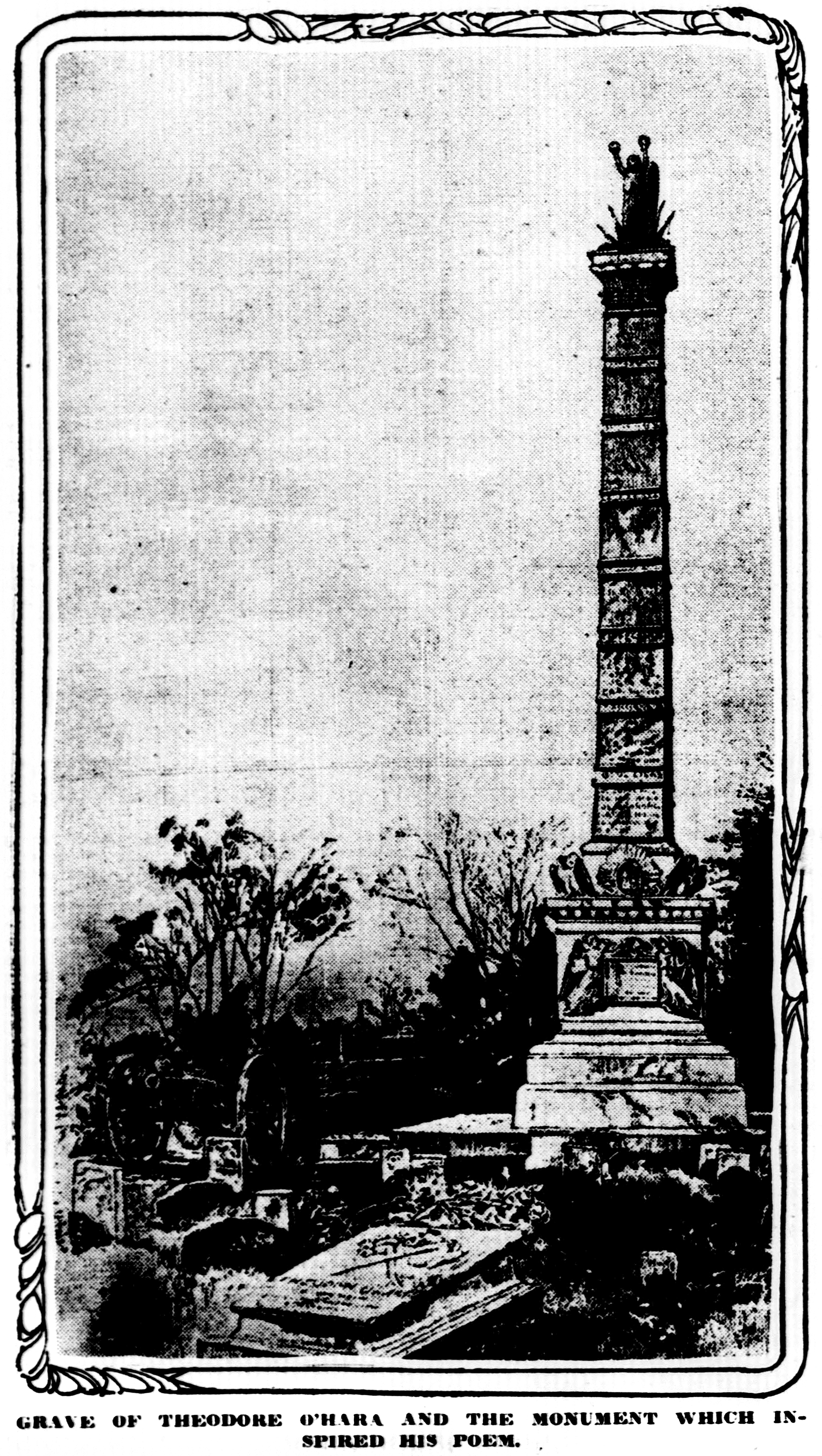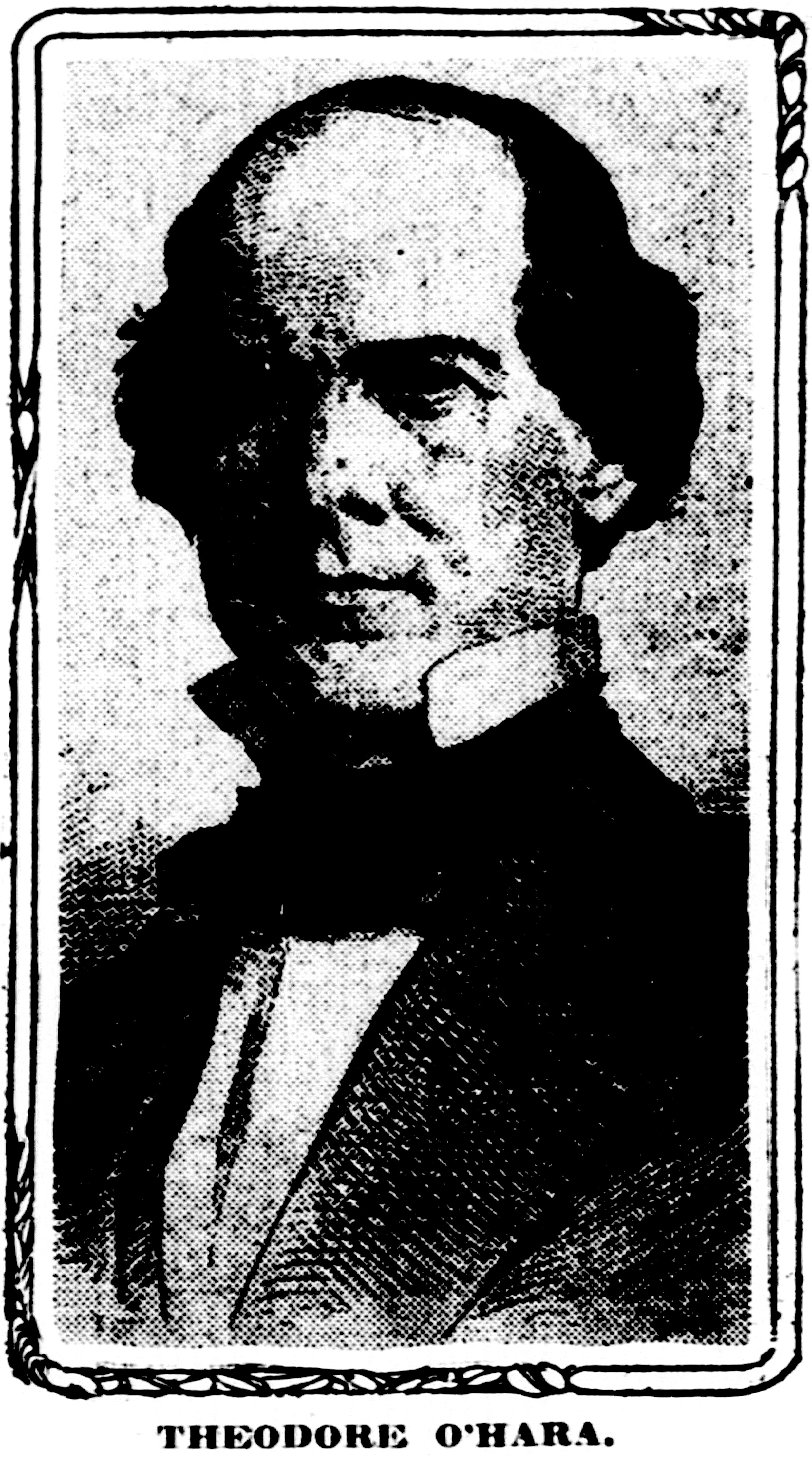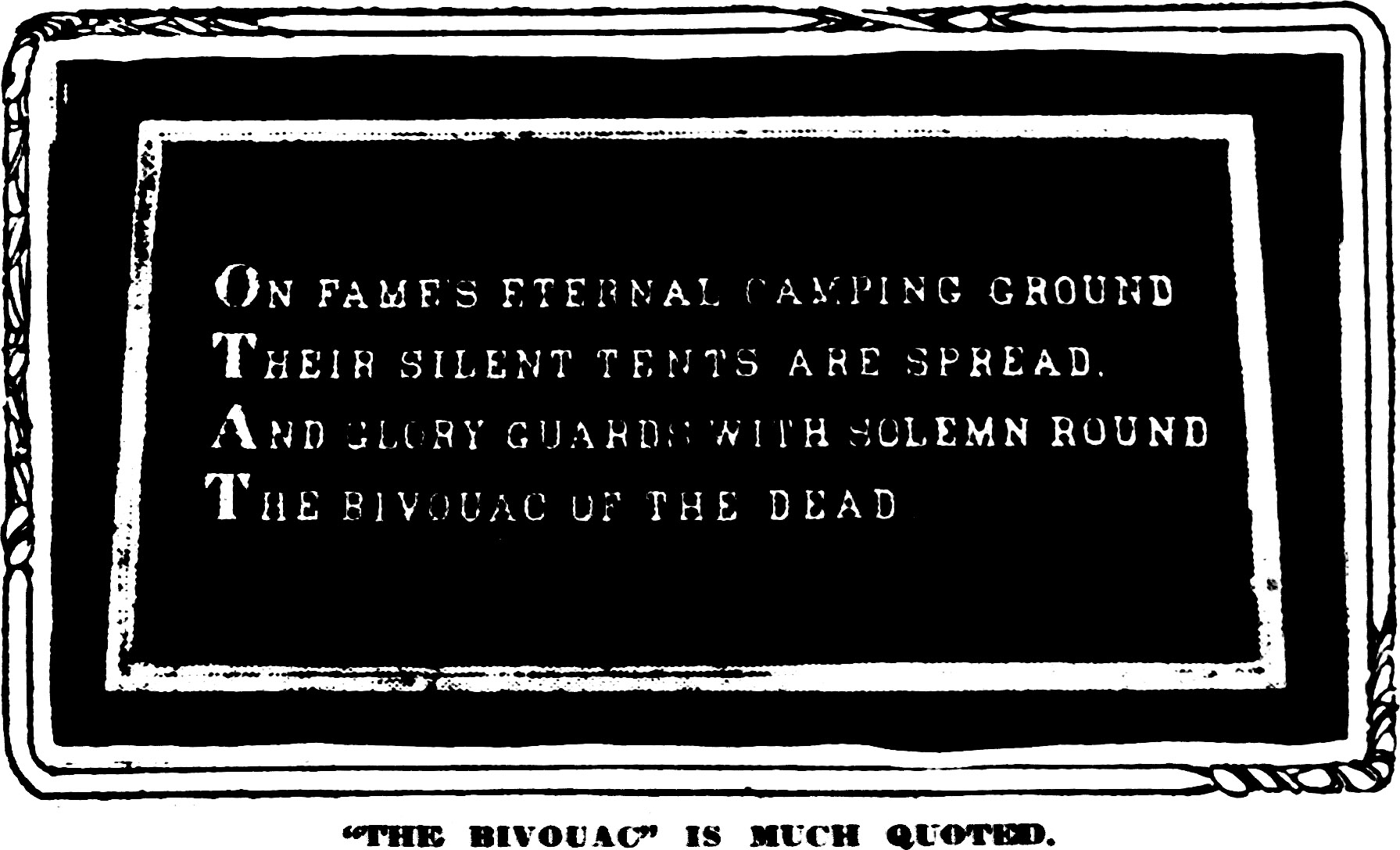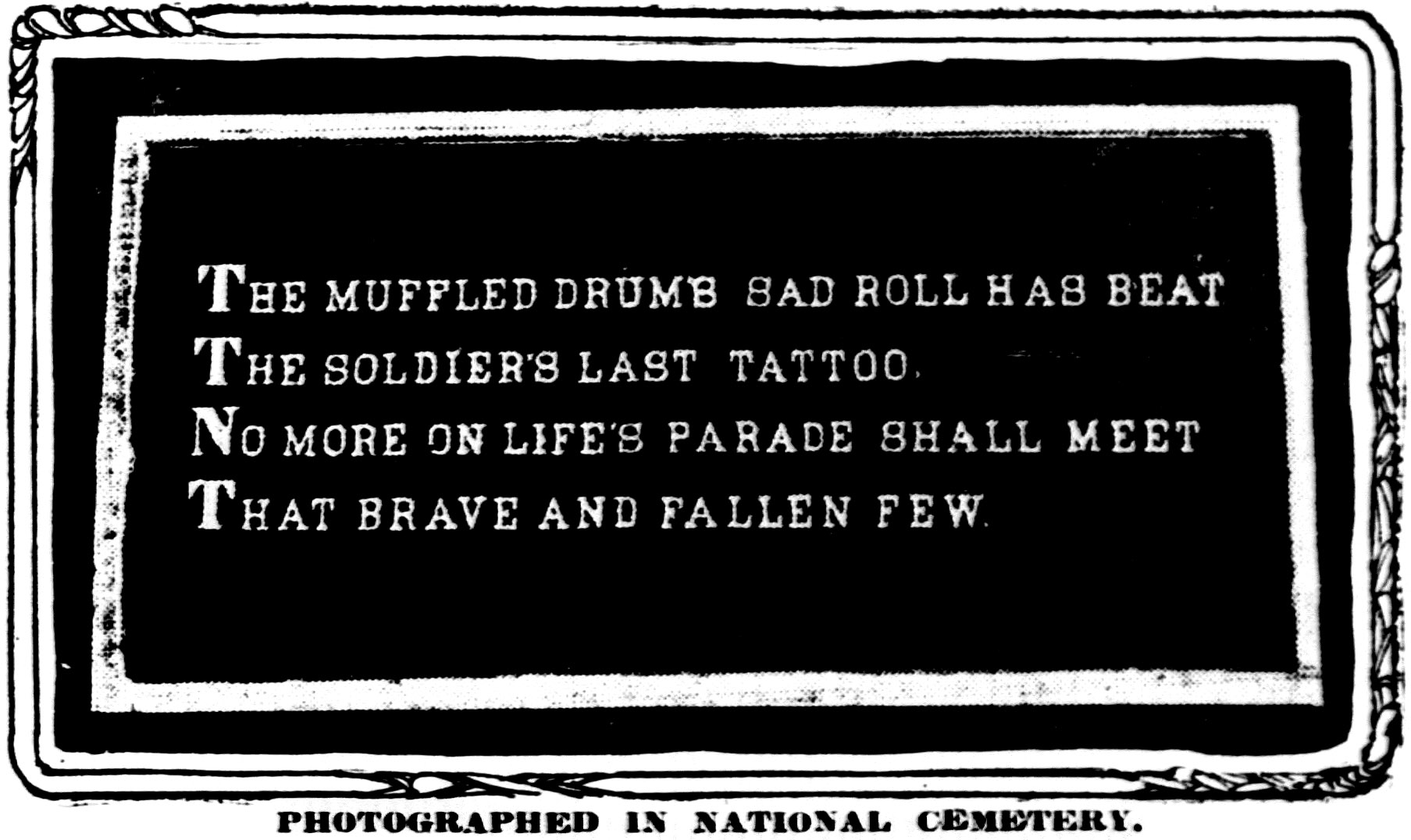Theodore O'Hara Designated as the Poet Laureate of National Cemeteries
AUTHOR of “The Bivouac of the Dead” the Greatest of All Bards in His Field.
His Life One of Fascinating Romance—Fought in Several Wars, and Was a True Adventurer—His Poem to Daniel Boone—Poems Are Much Quoted in Many Countries— A Kentuckian. His Grave Is Near That of Daniel Boone.
The bard of Memorial day, The poet of the national cemeteries, is Theodore O'Hara. The federal government has so designated him. In every national cemetery, from Arlington, Va., to Custer's battlefield, Montana, and back again to where the fighting men of the United States sleep, in the city of Mexico, are to be read the couplets of this poet, placed there by the government. For, in all these cemeteries, Uncle Sam has sought to place tablets that express most adequately the reverence of those who survive for the heroes who have died in battle. And, searching the whole world of literature, he found no poem that so far outshone all else that all the tablets in all the cemeteries contain lines from that poem and nothing else.

Grave of Theodore O'Hara and the Monument which Inspired His Poem.
This one surpassing poem of tribute to martial heroes that thus stands alone is “The Bivouac of the Dead.” The stately and solemn march of its couplets is like the winding of a funeral cortege beneath the shades where hover the spirits of the immortals. Yet through the mournful cadence steals the martial echo that but suggests the call to arms and the clash of swords in the battles that are past.
And, strangely, the man who thus becomes the spokesman of the spirit of the battles of the nation was one who fought valiantly against the Union for the four years of the civil war. Theodore O'Hara was a Confederate soldier and officer, who bore the crash of arms at Shiloh and guided the hand of Gen. Breckinridge at Stone river.
More than this, O'Hara was one of the most unfortunate geniuses that the nation has produced—a man who followed the bent of his heart and fought as a soldier of fortune in many lands, knew little but adversity, and rarely showed the jewel of genius that lay within him. His greatest day came when, as a youngster of twenty-seven, he rose to the great occasion and wrote at a sitting that poem which rivals “Gray's Elegy in a Country Chuchyard,” the perfect poem. On another great day he received in his arms on the field of battle the dead body of his commander Albert Sydney Johnston, and on another he crystallized the spirit of Daniel Boone in his only other poem, “The Old Pioneer.”
O'Hara was born in Kentucky in 1820 of a sire who was a political refugee of Ireland. The elder O'Hara was a man of great culture and refinement, and drilled the youngster in his Greek and steeped him in the old masters. Theodore went to Washington, where he served as a clerk in the Treasury Department and beat his aspiring wings against the bars of dull routine. His personality so impressed men in high places with whom he became acquainted that he was given a captaincy in the army just prior to the Mexican war.

Theodore O'Hara.
When the American arms pushed into Mexico the dashing young Kentuckian added the spirit of bubbling exuberance to every campfire. He fought in those battles of Buena Vista and Chapultepec and wherever else there was fighting, and so well did he bear himself that he was brevetted a major for gallantry in battle.
The spirit of the man was so restless, as has been the spirit of many another genius, that he did not remain with the army in times of peace. He resigned and practiced law in Washington for a while, but found other adventures that appealed more strongly.
It was about this time that the Lopez uprising occurred in Cuba, and manly young American adventurers enlisted in the cause of the liberation of that island and sailed away to fight its battles. O'Hara commanded one of the regiments that participated in the disastrous fight at Cardenas and from that battlefield he was carried, sorely wounded, while his comrades were badly beaten and broken up.
Not in the least discouraged, the spirit of adventure still surged within him and a little later he was found to be a member of an expedition under Walker which pushed into the center of Africa and returned much worse for wear and with little other than the experience of hardship to show for the trip.
In the years that followed the young adventurer played the game of editor in many southern cities. In Mobile, he was editor of the paper of Mr. Forsythe while that gentleman was abscent as minister to Mexico. In Louisville and Frankfort he similarly officiated and ultimately became editor of this own paper, the Yeoman, in Frankfort, Ky. It was here that the occasion arose that led to his writing the greatest mortuary poem in all history that today, as the behest of the government itself has become official.
Many experiences had been crowded into a span of but twenty-seven years of living when, in 1847, the state of Kentucky sent to Mexico and brought back the remains of her soldiers who had died in the war to the south and buried them with all military honors in the state cemetery at Frankfort. These were the men with whom O'Hara had campaigned, had fought, and had conquered. He knew of every experience that had led up to their deaths and had harbored in his breast every aspiration, every joy of battle that had been theirs. His friends and comrades were here to be buried.
O'Hara was asked by the Governor of Kentucky to write and read a poem upon the occasion of the burial of these, his comrades. In the office of the Yeoman in Frankfort, the lines that now are scattered throughout were penned. In a little saloon across the street from the statehouse they were first read and the auditors were former comrades at arms and young bloods there assembled. Those who heard pronounced the poem good and on the following day this, the greatest poem of its kind ever written, was read over the remains of the Kentucky soldiers who had died in Mexico.
The nook in the state cemetery at Frankfort were these men were buried has come peculiarly to shadow forth the spirit of O'Hara. The state erected a tall shaft in honor of the Mexican martyrs. When O'Hara read his poem there he little realized that he was detailing his own epitaph and that he too, too, would rest there and that these same lines would appear on his tomb. Yet such are the facts. At this time also there was no monument to Daniel Boone, who lay near the same spot in whose honor this poet was to write another elegy of rare beauty. Thus rounding out his couplet of poems in a lifetime.
THE BIVOUAC OF THE DEAD
The muffled drum's sad roll has beat
The soldier's last tattoo;
No more on life's parade shall meet
That brave and fallen few.
On Fame's eternal camping-ground
Their silent tents are spread,
And Glory guards, with solemn round,
The bivouac of the dead.
No answer of the foe's advance
Now swells upon the wind;
Nor troubled thought at midnight haunts
Of loved ones left behind;
No vision of the morrow's strife
The warrior's dream alarms;
No braying horn nor screaming fife
At dawn shall call to arms.
Their shivered swords are red with rust,
Their plumed heads are bowed,
Their haughty banner, trailed in dust,
Is now their martial shroud.
And plenteous funeral-tears have washed
The red stains from each brow,
And the proud forms, by battle gashed,
Are free from anguish now.
The neighing steed, the flashing blade,
The trumpet's stirring blast,
The charge, the dreadful cannonade,
The din and shout, are past;
Nor war's wild note nor glory's peal
Shall thrill with fierce delight
Those breasts that nevermore may feel
The rapture of the fight.
Like the dread northern hurricane
That sweeps his broad plateau,
Flushed with the triumph yet to gain,
Came down the serried foe.
Our heroes felt the shock and leapt
To meet them on the plain;
And long the pitying sky hath wept
Above our gallant slain
Sons of our consecrated ground
Ye must not slumber there,
Where stranger steps and tongues resound
Along the heedless air.
Your own proud land's heroic soil
Shall be your fitter grave;
She claims from war his richest spoil —
The ashes of her brave.
So 'neath their parent turf they rest,
Far from the gory field,
Borne to a Spartan mother's breast
On many a bloody shield.
The sunshine of their native sky
Smiles sadly on them here,
And kindred eyes and hearts watch by
The heroes sepulcher.
Rest on embalmed and sainted dead!
Dear as the blood ye gave;
No impious footstep here shall tread
The herbage of your grave;
Nor shall your glory be forgot
While fame her records keeps,
Or Honor points the hallowed spot
Where Valor proudly sleeps.
Yon marble minstrel's voiceless stone
In deathless song shall tell,
When many a vanquished age has flown,
The story of how ye fell;
Nor wreck, nor change, nor winter's blight,
Nor Time's remorseless doom,
Shall dim one ray of holy light
That gilds your glorious tomb.
The years that intervened between the writing of this poem an the outbreak of the civil war were spent in much the manner that other editors and gentlemen of letters of the time and place passed their lives in the interim Col. O'Hara gained much distinction as an orator of great polish, went on a number of diplomatic missions for his country and mingled freely with the men of affairs of his time. None of his enterprises turned out particularly successful, and he was but the brilliant editor of a struggling paper in Mobile Ala.

During these years appeared the poem to Daniel Boone, the pioneer. It is strange that the two only poems that O'Hara ever wrote should have been tributes to the departed. The “dirge to the brave old pioneer, knight errant of the wood,” “The old Druid of the west,” “Columbus of the land,” is full of touches of the master hand. Byron and his Don Juan had undertaken to lay down the life of this superman of the early days, but when his lines are compared with those of O'Hara they appear pale and weak.
O'Hara was a son of Kentucky and was familiar with the realm in which the man of skins and moccasins had battled with Tecumseh. His genius grasped and portrayed the glories that were wrapped up in this pioneer life, and the whole of it he wove into his dirge for the man whose grave was but a stone's throw from his comrades of the Mexican War and the spot where his own remains were eventually to rest.
When the civil war broke out Theodore O'Hara, still a man just past forty, immediately volunteered for service. He became colonel of the 12th Alabama Volunteers and was at first assigned to guarding the entrance of Mobile bay. Later he was on the staff of Gen. Albert Sydney Johnston, with whom he fought many battles. The esteem in which he was always held was shown whenever he was given any post in war or peace. His dash and finesse in battle has called forth much comment, and throughout the struggle of the states his service was most honorable. His spirit was that of a soldier, and his friends have always said that the happiest days of his life were those he spent in military service.
O'Hara was with Johnston at the terrific battle of Shiloh. As a member the staff of his chief he was by that officer's side when he fell. It was into the arms of the Irish-American poet-soldier that Johnston fell, mortally wounded in “rapture of the fight.”
Gen. John C. Breckinridge had been a boon companion and intimate friend of Col. O'Hara throughout his life. So it came to pass that after the death of Johnston the Irishman was transferred to the staff of Breckinridge, where he became its chief. In that capacity he served to the end of the war, participating in many a gallant piece of fighting and gaining particular distinction in that heroic charge at Stone river.
When the war was finally over Col. O'Hara, like many another southern gentleman of his kind, repaired to this south country and began the task of retrieving his fallen fortunes. But the Nemesis of bad luck that seems to vent her spleen on genius still hovered in his wake. He went to Columbus, Ga., where he engaged in the cotton business. Fortune seemed to smile until fire destroyed his warehouses and wrecked his business. Much discouraged, he retired to a planation on Chattahooche river, where two years later, he died of fever. At the time of his demise he was but forty-seven years of age, still unmarried, and his tall form was still straight and unbending, and his raven hair was slightly thinned by time.
In 1874 the state of Kentucky sent for the remains of the soldier-poet that they might be laid to rest in the cemetery where his great poem had been inspired. The spot for his grave is midway between the monument of the dead of the Mexican War and the monument to Daniel Boone, his best loved hero. When he was buried the “Bivouac of the Dead” was read over his grave and certain lines of it are inscribed on his tomb. The tattered banner under which he fought in Mexico was his shroud and the guns of surviving comrades were discharged over his grave.
Through all these years the poems of O'Hara had been steadily growing in fame. “The Bivouac” had gained distinction in America and broad even before the war. After the echoes of that conflict had died away the federal government attempted to gather up the dead of many battlefields and assemble them in national cemeteries. The states of the south followed a similar course with reference to their soldiers who died in battle. Eventually the government came to marking the graves of Confederates who died in the north, Confederates were admitted into the national cemeteries and breach was healed.
In this way great numbers of cemeteries have come to be maintained by the federal government. In all there are eighty-three of them. They are under the care of the War Department and a managed from Washington. All that may be done is to these resting places of the martial dead all that cemeteries should be. They are parked and guarded and cared for. The government contributes a monument to every soldier whose people ask for it. Finally it seeks to create just the right atmosphere in its cemeteries, and that this may be done tablets are placed about the walks and drives of these quiet stretches and these reflect the government's idea of the best sentiment that is to be had in all the records of all the men who have put thoughts on paper since the world began.
To secure this perfection of sentiment the government as resorted to the poem of the Confederate colonel, Theodore O'Hara. From one short poem, “The Bivouac of the Dead,” it has selected a dozen couplets and these it has cast into iron or bronze and wherever a tablet is placed one of these is used. So had Theodore O'Hara become the official national cemetery poet of the government. So has he become the only poet of the government that was ever officially designated and whose writings were ever officially used in any connection to the exclusion of others. So has he become the man who personifies the spirit of Memorial day.

(Copyright, 1913, by W. A. Du Puy.)
His poem to Daniel Boone follows:
THE OLD PIONEER
A dirge for the brave old pioneer!
Knight-errant of the wood!
Calmly beneath the green sod here
He rests from field and flood
The war-whoop and the panther's screams
No more his soul shall rouse,
For well the aged hunter dreams
Beside his good old spouse.
A dirge for the brave old pioneer!
Hushed now his rifle's peal;
The dews of many a vanish'd year
Are on his rusted steel;
His horn and pouch lie moldering
Upon the cabin-door;
The elk rests by the salted spring,
Nor flees the fierce wild boar.
A dirge for the brave old pioneer!
Old Druid of the West!
His offering was the fleet wild deer,
His shrine the mountain's crest.
Within his wildwood temple's space
An empire's towers nod,
Where erst, alone of all his race,
He knelt to Nature's God.
A dirge for the brave old pioneer!
Columbus of the land!
Who guided freedom's proud career
Beyond the conquer'd strand;
And gave her pilgrim sons a home
No monarch's step profanes,
Free as the chainless winds that roam
Upon its boundless plains.
A dirge for the brave old pioneer!
The muffled drum resound!
A Warrior is slumb'ring here
Beneath his battleground.
For not alone with beast of prey
The bloody strife he waged,
Foremost where'er the deadly fray
Of savage combat raged.
A dirge for the brave old pioneer!
A dirge for his old spouse!
For her who blest his forest cheer,
And kept his birchen house,
Now soundly by her chieftain may
The brave old dame sleep on,
The red man's step is far away,
The wolf's dread howl is gone.
A dirge for the brave old pioneer!
His pilgrimage is done;
He hunts no more the grizzly bear
About the setting sun.
Weary at last of chase and life,
He laid him here to rest,
Nor recks he now what sport or strife
Would tempt him further west.
A dirge for the brave old pioneer!
The patriarch of his tribe!
He sleeps--no pompous pile marks where,
No lines his deeds describe.
They raised no stone about him here,
Nor carved his deathless name—
An empire is his sepulchre,
His epitaph is Fame.
Theodore O'Hara Designated as the Poet Laureate of National Cemeteries by W. A. Du Puy, The Evening Star, Washington, D.C., May 25, 1913, Page 3. (PDF)